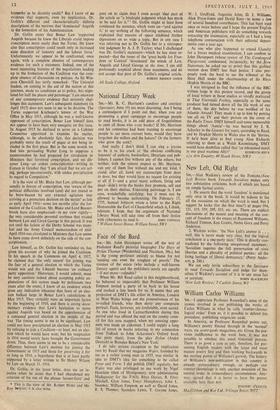Face of the Bard
SIR,—Mr. John Davenport writes off the text of Professor Read's pictorial biography The Days of
Dylan Thomas (Weidenfeld and Nicolson, 30s.), but is the young professor entirely to blame for not 'sending one even the roughest of proofs.' The trustees of the estate (who include a well-known literary agent) and the publishers surely are equally —if not more—culpable?
When Mr. Bill Read called in this neighbourhood, he behaved so impeccably that Professor William Empson invited a party of us back to his house and cooked a late lunch for us. It seems that any projection of DMT's life either in America, London or West Wales brings out the possessiveness of his so-called friends, who then decry any composite portrait. Facts, however, are irrefutable, even sacred. As one who lived in Carmarthenshire during this period and was offered the seat on the county coun- cil for this area mapped, when my amusing oppo- nent was made an alderman, I could supply a long list of errors in books referring to my connection from Tedlock to John Ackerman's Oxford book (the piety slant), from the play Dylan (Andr6 Deutsch) to Brendan Behan's New York.
I do take serious exception to the implication (not by Read) that my magazine Wales, founded by me as a rather young man in 1937, was similar in idea to DMT's idea for something to be called Prose and Verse. I did publish DMT regularly, but Wales was also privileged to use work by Nigel Heseltine (then of Montgomery, now administering Madagascar for the FAO), Rhys Davies, R. Elwy Mitchell, Glyn Jones, Emyr Humphreys, John L. Sweeney, William Empson, as well as David Jones, R. S. Thomas, Saunders Lewis, T. Gwynn Jones. W. J. Gruffydd, Augustus John, D. J. Williams, Alan Pryce-Jones and David Rees—to name a few of several hundred contributors. This has been used once or twice before and I hope the present English and American publishers will do something towards retracting the insinuation, especially as I had a long telephone conversation with their editorial depart- ments over a year ago.
As one who also happened to attend Llanelly for a forces medical examination, I can confirm to John Davenport (whose review of The Condenpted Playground, condemned, incidentally, by the .New Statesman, he asked me to print) that this garbled version does DMT less than justice. I also pur- posely took the bard to see the tribunal at the Shire Hall under the chairmanship of Sir Rhys Hopkin Morris of the BBC.
I was intrigued to find the influence of the BBC written large in this picture record, and the group of local writers in those studios so vividly portrayed in That Uncertain Feeling, especially as the same producer had turned down all the life work of one of them, the day before he was notified of his Atlantic Award! They made it up to him by putting 'em all on TV and their picture on the cover of the Radio Times. DMT himself said some' memorable things about 'Auntie'—he was barred by J. R. Ackerlcy in the Listenei for years, according to Read, and by Hopkin Morris in Wales also in the 'thirties. If he'd been alive to find young Alun Richards referring to them as a Welsh Kuomintang, DMT would have doubtless called that 'an inkstained insult










































 Previous page
Previous page